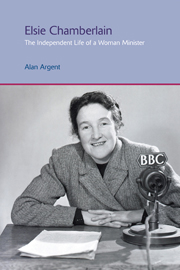Book contents
- Frontmatter
- Dedication
- Contents
- List of Illustrations
- Acknowledgements
- 1 Introduction and Early Life
- 2 The Call to the Ministry
- 3 Elsie Begins Her Ministry, 1939
- 4 The Return to London, 1941
- 5 Flying into the Storms: Chaplain in the Royal Air Force, 1945
- 6 A Season of Clear Shining: Married Life
- 7 Vineyard Congregational Church, Richmond-upon-Thames
- 8 Later Years at Vineyard
- 9 International Meetings and the CUEW Chair
- 10 Elsie at the BBC
- 11 After the BBC: The City Temple
- 12 The Sky Turns Black: Another Crisis
- 13 Sometimes a Light Surprises: The Congregational Federation
- 14 Hutton Free Church, 1971
- 15 A Local Thunderstorm: The Kentish Town Situation
- 16 Presidential Duties and Travelling, 1973–1980
- 17 Going West, 1980
- 18 Ministry in Nottingham, 1984–1991
- 19 Epilogue
- Bibliography
- Index
9 - International Meetings and the CUEW Chair
- Frontmatter
- Dedication
- Contents
- List of Illustrations
- Acknowledgements
- 1 Introduction and Early Life
- 2 The Call to the Ministry
- 3 Elsie Begins Her Ministry, 1939
- 4 The Return to London, 1941
- 5 Flying into the Storms: Chaplain in the Royal Air Force, 1945
- 6 A Season of Clear Shining: Married Life
- 7 Vineyard Congregational Church, Richmond-upon-Thames
- 8 Later Years at Vineyard
- 9 International Meetings and the CUEW Chair
- 10 Elsie at the BBC
- 11 After the BBC: The City Temple
- 12 The Sky Turns Black: Another Crisis
- 13 Sometimes a Light Surprises: The Congregational Federation
- 14 Hutton Free Church, 1971
- 15 A Local Thunderstorm: The Kentish Town Situation
- 16 Presidential Duties and Travelling, 1973–1980
- 17 Going West, 1980
- 18 Ministry in Nottingham, 1984–1991
- 19 Epilogue
- Bibliography
- Index
Summary
In the late 1940s and early 1950s, Elsie Chamberlain came to enjoy a high public profile, both without and within the churches, and not merely among her fellow Congregationalists. At this time she became involved with the International Congregational Council and with the World Council of Churches. Simultaneously her work for the BBC Religious Broadcasting department brought her into contact with many of the leading clergy in Britain's denominations. Indeed that work may have reinforced her desire to attend these major events and may also correspondingly have benefited from such attendance. This rapid rise, from the relative obscurity of a lowly suburban minister to an ecclesiastical celebrity, culminated in her election to the chair of the Congregational Union of England and Wales. These few years were undoubtedly those of her greatest influence. She had come far from the streets of Liverpool 8 and the unusual training for the ministry she had received there in wartime!
The International Congregational Council at Wellesley
In June 1949, Elsie Chamberlain was among the delegates from Britain who gathered at Waterloo Railway Station, in London, and who journeyed by train and by sea, on board the liner, ‘Queen Elizabeth’, to the United States of America for the sixth International Congregational Council meetings at Wellesley College, Wellesley, Massachusetts. The superb hospitality afforded by the Americans to their visitors in New York and elsewhere was at times, in the words of one Briton, ‘almost overwhelming’ and ‘amazing’.
- Type
- Chapter
- Information
- Elsie ChamberlainThe Independent Life of a Woman Minister, pp. 93 - 107Publisher: Acumen PublishingPrint publication year: 2012



